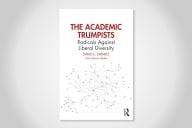You have /5 articles left.
Sign up for a free account or log in.
Tenure is a touchy subject right now within the University of Wisconsin System, given the new limitations placed on the concept this summer by the state’s conservative-dominated Legislature. So a survey that arrived in faculty members’ inboxes earlier this week, asking for their opinions on tenure, drew immediate interest and participation. Sure, the survey asked some provocative questions, such as how much of a pay raise faculty members would need to give up tenure in exchange for multiyear contracts. But the survey had the imprimatur of a prestigious research institution, the University of Chicago, and a well-known political scientist was running the project. Plus, some faculty members welcomed the opportunity to vent about the ongoing challenges to tenure.
But then they got curious, if not suspicious. Just why was William Howell, the Sydney Stein Professor in American Politics at Chicago, interested in their views on tenure, and how would he use the data? How did he get all their email addresses? And who was funding the study, since that information was not provided either in the email or the survey itself?
“There was the percentage increase question, and then another question about how employable you feel you are outside of the academy,” said Lisa Cooper, an associate professor of English at the Madison campus. She did not fill out the survey after colleagues raised concerns. “They’re relatively straightforward, but when you add them up, and consider the fact that they’d only let you answer in certain ways -- colleagues, for example, said that when they tried to answer that money and tenure were not commensurable, the survey said it was invalid -- it was hard not to be suspicious.”
David Vanness, an associate professor of health population science at Madison, was similarly concerned. “Other questions failed to include ‘Don’t know’ or ‘Refused’ options and therefore forced individuals to accept the premise or framing of the question,” he said.
Moreover, it wasn’t possible to delete responses after proceeding, Vanness said. “I personally abandoned the survey before reaching the end for this exact reason. I felt I was being steered to a particular point of view and did not want to be a part of that process.”
Of course anyone surveying the Wisconsin faculty would not exactly be polling the average sample. These are professors who know something about survey design, about the informed consent of those in research projects and about how to look for bias.
A flurry of emails ensued between faculty members, the secretary of the Faculty Senate, a university spokesman and Howell himself. Soon it was revealed that the Wisconsin Policy Research Institute, which describes itself as a nonpartisan think tank, was funding the survey. But who was funding the institute? With rumors flying -- including one that the institute had ties to American Legislative Exchange Council, a group that drafts model legislation to promote conservative principles -- faculty members who already had completed the survey frantically contacted Howell to ask him to delete their responses. Some did so partly out of fear that their views on tenure could be merged with other publicly available information about them.
Steven Smith, secretary of the Faculty Senate at Madison and associate director of the global studies program, said he was contacted by at least 100 concerned faculty members, and encouraged them to contact Howell.
Howell reminded faculty members that their participation was totally voluntary, and honored requests to delete responses. A university spokesman said faculty members’ addresses were obtained as part of an open records act request, and that their privacy would be protected. But just two days after sending out the survey, Howell shut it down. He still plans to analyze what data he gathered.
While some faculty members have expressed relief that the survey is no longer up, others say they’re concerned about the information that was collected, and how it will be used. Howell and the policy institute, meanwhile, say that they’re merely tracking a live policy issue, and that all results will be made publicly available.
The think tank “has no connection whatsoever to ALEC,” Mike Nichols, its president, wrote in a letter Thursday to John Behling, vice president of the University of Wisconsin System’s Board of Regents and chair of its Tenure Policy Task Force, which is looking at tenure in light of the new state law making it easier for tenured faculty members to be fired. “We are a nonpartisan, nonprofit, wholly independent 501(c)(3) that is governed by an independent board of directors focused on providing objective information about important policy issues in the state of Wisconsin.”
Calling at least one faculty member’s allegation that the institute had a conservative agenda an “apparent attempt to trammel honest inquiry,” Nichols said that the institute approached Howell to conduct the survey of university system faculty. He in turn secured the approval of Chicago’s institutional review board, designed the survey and will independently analyze results -- which he’ll make public, Nichols reiterated.
“Neither he nor anyone at [the institute] has any preconceived notions regarding the findings,” Nichols said of Howell. “He is simply asking questions that … will allow all Wisconsinites an opportunity to sift and winnow all objective information pertinent to a live policy debate.”
Nichols said in an interview that the institute has researched a wide array policy issues in its 25 years, from taxation to economic development to education, both K-12 and postsecondary. Recent reports include one on the economic impact of Wisconsin's controversial anti-union legislation suggesting that "what a plurality of state residents intuitively believe -- that right-to-work laws are economically beneficial -- is backed up by statistical analysis." Another makes the case for increased accountability in special education. Another makes the case for the University of Wisconsin System to get more involved in "ground-level" economic development.
Tenure is of issue right now, he said, because there’s a gap between “good, objective research” on the subject and public interest.
Howell’s data are likely to be published on the institute’s website, he said, and sent to policy makers, the university system’s board, administrators, faculty and anyone else who’s interested.
Nichols said that the institute alone decides which policy areas deserve more attention and then finds “the smartest, most objective people we can to do the research.” He again denied ties to ALEC, but acknowledged that the institute does accept funding from the Lynde and Harry Bradley Foundation, a conservative, pro-business group based in Milwaukee.
“Some of our donors are conservative, but we are nonpartisan -- not affiliated in any way with any political party or politician -- and, at any rate, we have no control over the tenure research being conducted” by Howell, he said.
Nichols added, “Tenure is clearly a very important topic and we are simply asking questions no one else ever has. We hope the answers -- whatever they might be -- are useful.”
The ALEC allegations came largely from the institute’s profile on SourceWatch.org, a political funding watchdog site. SourceWatch notes that the institute says it is “guided by a belief that competitive free markets, limited government, private initiative and personal responsibility are essential to our democratic way of life.” It says that the institute is linked to ALEC through a former fellow and contributing writer, a state lawmaker who is an ALEC board member.
Nichols denied that that link in any way influenced the institute’s research direction. He said the person in question had written infrequently for the institute, and that "to say we are linked somehow to every person who has ever contributed any writing -- and to any group they belong to -- is ridiculous."
Howell, whose first academic job was at Madison, said he had “great fondness for the institution. My only interest here is to provide objective, fair-minded information about what faculty members think about this important issue.”
Howell said the survey was a “basic issue of academic freedom.” He said he followed all requisite procedures for conducting research, including consulting his IRB -- which he said does not require a disclosure of funding while the survey is in the field. He said he was in no way acting on behalf of an organized interest, as to do so “would violate the most essential values of rigorous and objective academic research.”
That said, Howell said he did take down the survey late Wednesday, after about 25 percent of the sample responded. “Given the level of misinformation about the purposes of this survey, and given the reasonably high response rate, I opted to take it down” after sending out a deadline notice that morning, he said. He'll go ahead with his analysis.
Howell said he’d long been interested in education, and he’d done many studies characterizing the state of public thinking about related issues.
“The only difference here is that I focused on the specific population most directly affected by a policy change rather than, say, a random sample of adults,” he said, noting all responses would be anonymized.
Still, faculty members are worried the data sample won’t be valuable or representative of the faculty’s opinion on such an important issue. Vanness said he was convinced that the only people who’d finished the survey were likely to be those with pre-existing “flexible” views about tenure.
Cooper said faculty attitudes about tenure were too important to get wrong, given the current environment surrounding tenure in Wisconsin. The new state law makes it possible for tenured faculty members to be terminated under circumstances including a program "redirection" -- not just under financial exigency, as was previously the case.
Depending on one’s definition of worth, that puts a whole range of humanities programs at risk, she said. That's because it is much harder to make an “economic argument” for them in a time of grave budget cuts -- some $250 million across the system in the next two years.
Put another way, Cooper said, tenure is often discussed as a way to protect researchers doing work that might be controversial, especially in the sciences. But it’s as much about “protecting against the loss of knowledge as it as about protecting the creation of new knowledge,” she said.









